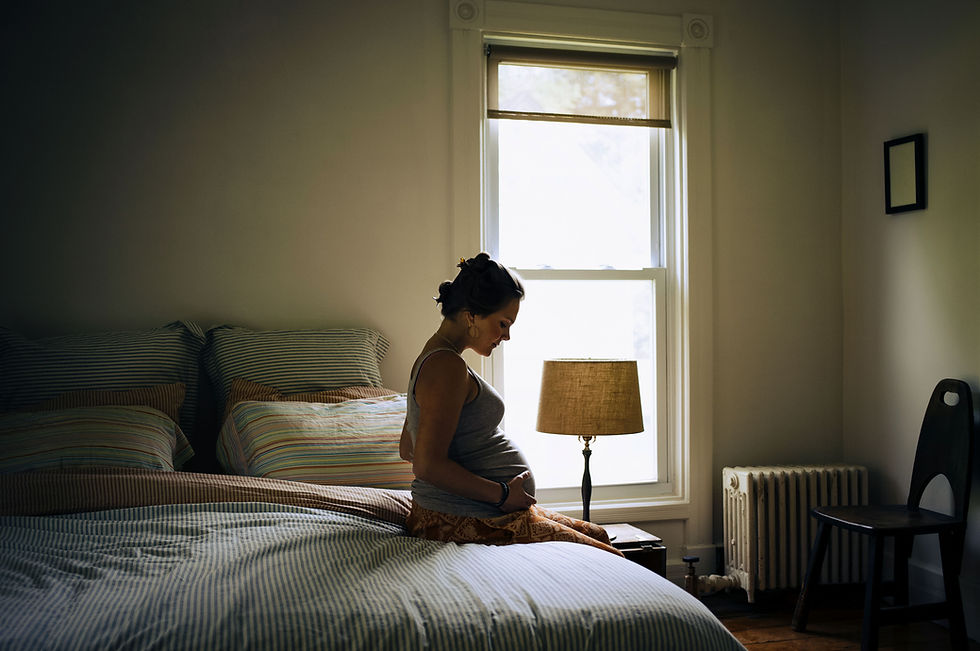Understanding the Causes of Perinatal Mental Health Difficulties
- Suzie Booth

- Nov 10, 2025
- 3 min read
Updated: Nov 17, 2025
by Suzie Booth, Counsellor/Psychotherapist (MSc. MBACP accred.)
The truth is, we still don’t completely understand what causes perinatal mental health difficulties. There’s no single, clear reason why some people struggle during pregnancy or after birth while others don’t. But we do know there are certain factors that can make this time feel harder, and recognising them can really help us look after ourselves.
Your mental health history
Your mental health history can give us a few clues about how you might experience the perinatal period. There’s no rulebook, but if you’ve struggled with anxiety in the past, you might be slightly more likely to experience perinatal anxiety. The same goes for depression.
And if you’ve had bipolar disorder, there’s a higher chance of developing something like postpartum psychosis, though it’s still very rare. So, your past experiences don’t determine your future, but they can give us an idea of what kind of support you might need.
Support (or lack of it) really matters
Having a baby is one of the most demanding and emotional transitions we go through. It’s beautiful and life-changing, but it’s also really, really hard work.
If you don’t have a strong support network around you, that emotional and physical strain can feel heavier. Maybe you don’t live near family, or your partner works long hours, or you just don’t have many people to lean on.
In these times, it’s so important to try and build even a small web of support. Could you plan for family or friends to visit once the baby is born? Or think about who you could reach out to locally; a friend, a neighbour, a parent group, even a postnatal support service. Having people around who can help you rest, talk things through, or simply make you a cup of tea can make such a difference.

How our childhood shapes our parenthood
When we become parents, our own childhood experiences have a way of re-emerging. If you grew up with loss, trauma, or a difficult family dynamic, it’s not unusual for those feelings to resurface once you have a baby.
Sometimes, things that we thought we’d 'dealt with' can get re-triggered as we start to build our own family. Our attachment styles, the way we relate to others, and our feelings about being cared for, all of it can start to replay.
If you can, it’s worth taking some time (ideally before becoming a parent, but it’s never too late) to reflect on and process those earlier experiences. Therapy can be a really safe space to do that.
How we feel about ourselves
Our sense of self and self-esteem play a big role in how we experience parenthood. If we don’t feel capable or confident, we might interpret every cry or unsettled moment as a sign that we’re doing something wrong.
It’s incredibly hard to feel steady, empowered, and nurturing for our children if deep down we don’t feel those things for ourselves. Building self-compassion and acknowledging that we’re doing our best, even when things feel messy, is key.
Life stress and big changes
Then there are the external stresses: moving house, financial worries, relationship changes, bereavement, or any big life upheaval. High levels of stress and anxiety, especially during pregnancy or early parenthood, can have a real impact on our emotional wellbeing.
Of course, life rarely stays calm and controlled, especially with a baby. But finding small ways to create calm moments; slowing your breathing, resting when you can, asking for help, saying “no” more often, can all help reduce the emotional load.
A final thought
There’s no single cause of perinatal mental health difficulties. What we know is that certain factors can make it more likely, but none of them mean it’s inevitable. You could have a history of anxiety and feel absolutely fine during pregnancy. Or you could have every support in the world and still find yourself struggling.
What matters most is remembering that it’s not your fault — and that support and recovery are absolutely possible. Try to be gentle with yourself in this season. You deserve care, too.
Next time we will look at where and how to find support in this perinatal period.




Comments